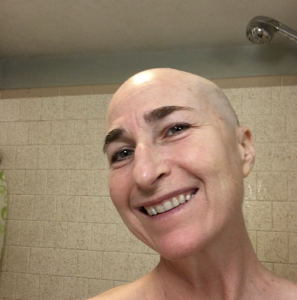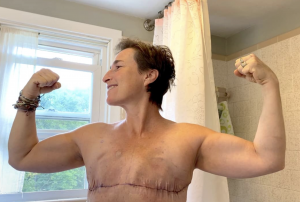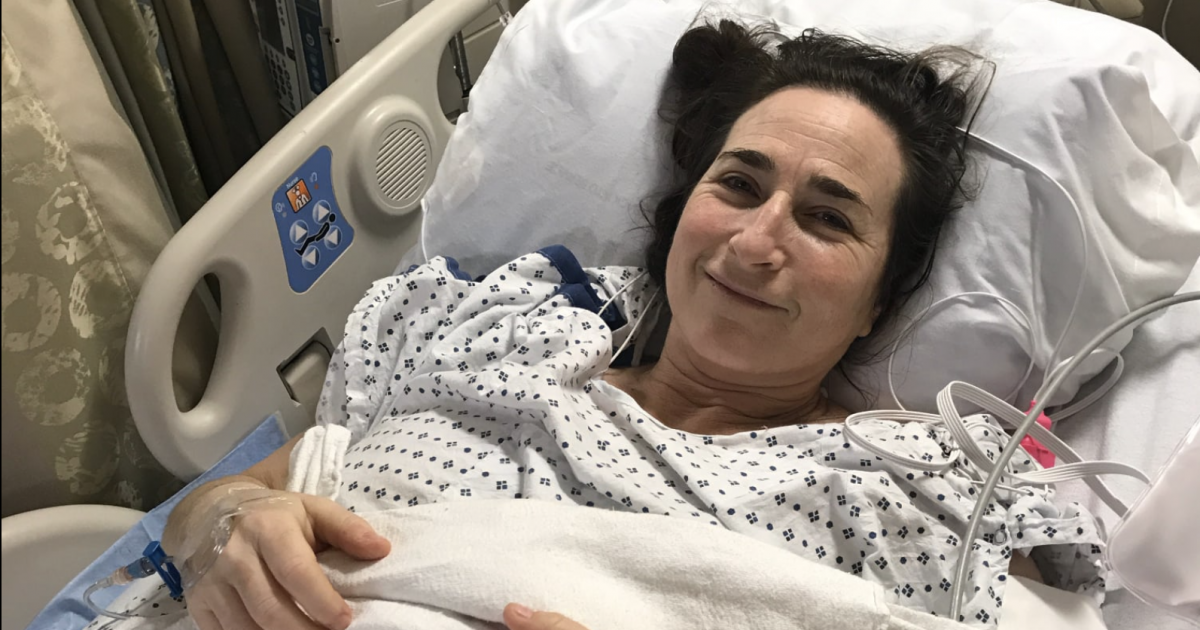An Ovarian Cancer Warrior, 52, Becomes A Breast Cancer Previvor During COVID Pandemic
- Djohariah Singer, 52, is battling stage IV ovarian cancer. She is almost three years into that battle, having been diagnosed when she went to see a doctor about her constant stomach and groin pain. She says that the COVID pandemic has helped her battle the disease by allowing her to limit her energy and focus on her health.
- Over the summer, she learned that she had the BRCA mutation and underwent a bilateral mastectomy. She is still receiving chemo for her ovarian cancer and takes a targeted therapy that is meant to extend her life but causes her to sleep for up to 15 hours at times.
- “Because the symptoms are often negligible and easy to dismiss, ovarian cancer can be one of those stealth illnesses that go unnoticed until it's reached a late stage,” Dr. Beth Karlan, a gynecologic oncologist at UCLA Medical Center, previously told SurvivorNet.
Djohariah Singer, 52, is battling stage IV ovarian cancer. She is almost three years into that battle, having been diagnosed when she went to see a doctor about her constant stomach and groin pain.
Read More
"I see myself fighting in a different way," said Singer. "My life isn't about beating cancer, my life is going to be how do I live with cancer. And the more I can learn to dance with this, the more gracefully I dance with it, the longer I will live."
In that sense, Singer believes the pandemic is crucial to her survival, and it has allowed her to limit her interactions and focus on herself and her own well-being.
"I have enough life force and will for only keeping myself still on this planet at this point," explained the former police officer. "COVID has made it easier to do that."
The singer did experience several problems once the pandemic hit, starting with a five-week delay in her chemo treatment.
That delay came about because she could not receive infusions at home as it required her to have a medical port implant, which at the time qualified as elective surgery.
The chemo was needed to slow the spread of cancer, which by the time of her diagnosis had spread to her cervix, uterus, fallopian tubes, colon, appendix, spleen, and part of her liver and diaphragm.

She is still receiving chemo as she enters year three while also taking targeted therapy to prolong her life. Singer lamented, however, that this same drug also causes her to sleep for 15 hours at times.
In the middle of all this, doctors found a concerning lump in her breast. The singer underwent surgery to remove the growth, which doctors determined to be benign.
She tested positive for the BRCA gene and scheduled a bilateral mastectomy a year later.
Singer had the operation in September, noting afterward: “I lost my hair, and I have no breasts and no lady parts to speak of. … What is being a woman anymore?”
Her daughter Nalaina, 13, also felt a shift and commented how different it felt to snuggle up to her mother.
Singer responded: “Yeah, but look, now you are closer to my heart.”
Diagnosing Ovarian Cancer
“Because the symptoms are often negligible and easy to dismiss, ovarian cancer can be one of those stealth illnesses that go unnoticed until it's reached a late stage,” Dr. Beth Karlan, a gynecologic oncologist at UCLA Medical Center, previously told SurvivorNet.
“After all, who hasn't felt overly full on occasion? Or needed to urinate a little more often than normal? Because most, but not all, cases occur in menopausal women, the bloating, pelvic pain, and other symptoms may seem unremarkable when so many other things are going on within a woman's reproductive organs.”
Dr. Karlan explained that these factors explain why there is an average delay of nine months between when a woman first experiences symptoms of the disease and her diagnosis.
She encourages women who experience the following symptoms for a week or more to see their doctor and ask for an ovarian cancer screening. Those with a history of the disease should do the same after 30, if not sooner, even if they are not yet experiencing symptoms.
- Bloating
- Severe pelvic or abdominal pain
- Difficulty eating or a feeling of fullness that makes it painful to eat
- Sudden and frequent urges to urinate
- Fatigue
- Upset stomach
- Back pain that can feel similar to a UTI
- Pain during sex
- Constipation
- Heavier than usual menstruation or spotting
- Distended stomach or abdominal swelling coupled with weight loss
Ways To Diagnose Ovarian Cancer
Misdiagnosing Ovarian Cancer
Djohariah Singer said that she only experienced symptoms in the weeks before her diagnosis, but in hindsight, some of the signs may have been there for some time.
Jackie Liu has a remarkably similar story, experiencing the same symptoms before eventually discovering she was battling the disease.
“So in hindsight, knowing what I know now, I probably had symptoms for a while,” Liu previously told SurvivorNet.
“It began with bloating, but I worked in healthcare, and so you don’t necessarily eat very healthy, so I chalked it up to food issues. And then I had a lot of pain during sex, which wasn’t a thing for me until about a year before I was diagnosed. So every time I had sex, it was very, very painful. I also had bladder spasms, which were misdiagnosed as a UTI constantly.”
There was also severe abdominal pain which resulted in Liu’s hospitalization.
“I was in the middle of nowhere in Nevada, and I had lower right abdominal pain that I thought was appendicitis. So I went to the ER, and that’s where they scanned me and found a huge mass,” recalled Liu.
She was released from that facility and returned to a hospital closer to her home in Virginia, better equipped to treat her. After a scan confirmed what doctors in Nevada had found, she underwent surgery just a few weeks later.
Liu also made the same decision that Singer did and underwent a full hysterectomy.
Ovarian Cancer Survivor Hopes To have Good Sex Once Again.
Learn more about SurvivorNet's rigorous medical review process.


